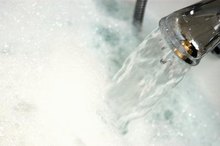How to Get Rid of a Sinus Infection Without Antibiotics
A sinus infection occurs when the nasal cavities become infected. Triggered by a virus or bacteria, this infection is often mistaken for the common cold -- although a sinus infection lasts much longer. Symptoms include runny nose, nasal congestion, headache and facial pain.
If you are experiencing serious medical symptoms, seek emergency treatment immediately.
Most of the time, antibiotics are not necessary to treat sinus infections because the cause is viral and the infection clears up on its own. Although there is no home remedy that can cure a sinus infection, the following steps may improve comfort and ease symptoms while your body does its job fighting the infection.
Tips
Home treatment may work to ease symptoms as your body recovers from a viral infection, but if you have a bacterial infection, you'll need antibiotic treatment.
The best way to tell the difference is to pay attention to symptom duration. For instance, viral sinus infections tend to get better after five to seven days, while bacterial sinus infections tends to last longer, and may worsen after a week.
Hydrate
Drink plenty of fluids to thin nasal secretions, help the sinuses drain and decrease congestion. Staying well hydrated also keeps mucous membranes moist. Try hot tea, broth, soup, water, ice pops or fruit juices. If you also have a sore throat, try drinking hot water with honey and lemon, or hot tea with honey to ease symptoms.
Moisten
Sinus Infection Relief During Pregnancy
Learn More
If your sinuses are exposed to dry air, the mucous membranes can become dry and mucus can become too thick. So keep your nasal passages moist to relieve congestion and ease symptoms.
Use a saline nasal spray, run a humidifier in your bedroom, or inhale the steam from a hot shower or bath. Place a hot, wet washcloth over your face to open nasal passages and promote drainage. This heat may also reduce the uncomfortable pressure and decrease sinus and facial pain.
Rinse
Although some people find these cumbersome or uncomfortable, nasal saline washes can be effective in clearing thickened mucus from the nasal passages — thus easing the symptoms of a sinus infection.
Also called saline nasal irrigation or nasal rinses, this therapy rinses the nasal cavity with a mild saline water. Saline rinses can be used at home using a neti pot or a sinus rinse kit, and the solution can be mixed using a nasal saline salt packet, available over-the-counter at pharmacies. Follow package directions and use only distilled or boiled and cooled water to ensure safety.
Sleep Well
Nasal Congestion During Massage & Acupuncture
Learn More
If it's uncomfortable to sleep, prop your head up with pillows, or sleep with the pain-free side of your face on your pillow. During the daytime, try resting in a recliner to facilitate drainage of the sinuses and to ease congestion. Get plenty of rest to help your immune system fight the infection.
Manage Pain
Take over-the-counter (OTC) medications to relieve your symptoms as needed. Pain relievers such as acetaminophen or ibuprofen can reduce your fever, treat headaches and lessen aches and pains.
Nasal decongestant sprays may temporarily ease your congestion, but they shouldn't be used for more than 3 days 3. If you are under a doctor's care for any other medical conditions, or if you need advice on OTC products to use, talk to your doctor.
Reviewed by Kay Peck, MPH RD
Warnings
If your systems aren't improving after 10 days, or if your symptoms are severe or include a fever of 102 degrees Fahrenheit, contact your doctor. Also let your doctor know if you have vision changes or swelling around the eyes, if you have a headache that won't improve with pain relievers, or if you are feeling poorly and need advice on managing your symptoms.
Related Articles
References
- American College of Allergy, Asthma & Immunology: Sinus Infection
- Clinical Infectious Diseases: Executive Summary: IDSA Clinical Practice Guideline for Acute Bacterial Rhinosinusitis in Children and Adults
- Merck Manual: Sinusitis
- American Family Physician: Saline Nasal Irrigation for Sinus Problems
- MedlinePlus. Sinusitis. Updated May 17, 2018.
- Centers for Disease Control and Prevention. Flu: What to do if you get sick. Updated October 8, 2019.
- American Academy of Allergy, Asthma, & Immunology. Patients self-medicating: persistent rhinitis overuse decongestant nasal sprays. Updated March 31, 2014.
Writer Bio
Michelle Kulas worked in the health-care field for 10 years, serving as a certified nurses' assistant, dental assistant and dental insurance billing coordinator. Her areas of expertise include health and dental topics, parenting, nutrition, homeschooling and travel.









